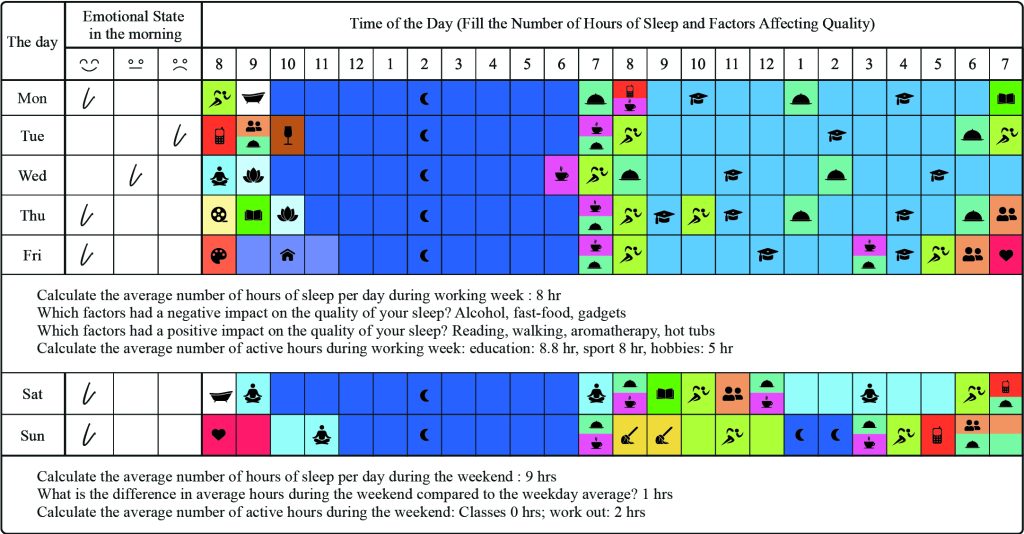
 – alcohol
– alcohol – work out (gym, walks, yoga, pilates, etc.)
– work out (gym, walks, yoga, pilates, etc.) – gadgets (social media, games, messengers, etc.)
– gadgets (social media, games, messengers, etc.) – coffee and energetic drinks
– coffee and energetic drinks – meals
– meals – work
– work – education
– education – reading
– reading – sleep
– sleep – family and friends
– family and friends – home
– home – tv
– tv – meditation and relax
– meditation and relax – hobby and other activities
– hobby and other activities – date, relationship
– date, relationship – chill
– chillSleep Patterns
In this weekly tracker example, there is a slight difference between the amount of sleep during the workweek (average of 8 hours) and the weekends (average of 9 hours). This suggests a compensatory shift of sleep deficit from Friday to the first day of the weekend, rather than the presence of social jet lag. The recommended amount of sleep is 8 hours.
Determining Chronotype
This chronotype corresponds to the early type (lark). For early birds, evening rituals and an early bedtime are crucial for being full of strength and energy the next day. This type can also benefit from a daytime nap for recovery if possible. The ideal wake-up time without an alarm is 6 AM during the summer, with bedtime at 10 PM.
Habits Affecting Sleep Quality
In this tracker, habits negatively affecting sleep quality are linked to the morning chronotype. Evening gadget use, alcohol consumption, and heavy meals impair the sleep process and reduce nighttime recovery quality.
Positive habits that improve sleep quality and recovery include relaxing walks, reading, baths, and aromatherapy.
The meal schedule is well-organized, supporting a stable energy level throughout the day: breakfast right after waking up, lunch during the peak productivity window, and an early dinner. Regular walks boost metabolism and reset brain function, enhancing cognitive abilities for learning and information retention.
Alcohol consumption is minimal, but as noted in the tracker, it significantly impacts the organism, reducing nighttime recovery.
Balance of Active Hours and Rest Hours (Including Weekend Rest)
In this example, the workweek is very active and filled with intensive study. The weekends are not only busy but also varied, ensuring quality body recovery. Replacing coffee after waking up with tea could further enhance efficiency. Over time, this will help the body produce more natural cortisol in response to sunlight and stabilize mood in the first half of the day.
Seasonality and Region
This tracker uses typical indicators for the summer period in the European zone, where increased daylight hours result in high productivity. During periods of less active sunlight, this chronotype will tend to wake up later and possibly require more hours of recovery.



